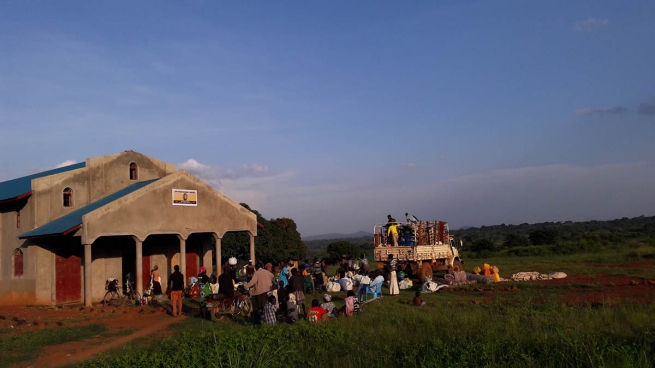SOUTH SUDAN: Salesian Missionaries Providing Shelter, Services to Those Facing Violence in Morobo

(MissionNewswire) The Salesian-run Don Bosco Mission Morobo in South Sudan has been working with local residents to keep safe and prepared in the event the violent clashes that have been happening across the country erupt in their local area. Morobo County is located in the southern central tip of the South Sudan close to both Uganda and the Democratic Republic of Congo. The county had been very peaceful and calm until July 2016, when armed conflict again resumed in Juba, the capital of South Sudan, and in many of the other parts of the country.
Since that time, the people in Morobo have been suffering with insecurity. Salesian missionaries living and working in the area report that all over the county a rebel-opposition armed force has been building up and has been gaining strength day by day. There have been reports of attacks by these rebel forces on the national army causing many deaths and wounding many more.
The local people are very peace-loving and make their daily living mainly through farming. They fear retaliation, and as a result, have been seeking a safer and more peaceful place to live. Those who are able to have fled across the boarders into Uganda and the DR Congo. Many of the local residents that take part in local Salesian programs fear that their small houses, which are made of mud and grass-roofs, could be burned to the ground. People who cannot afford to bring their belongings with them as they flee are bringing their belongings to the Don Bosco church for safe keeping.
“Salesian missionaries across the South Sudan are reporting that the needs of the people are great with many who are in need of food, shelter, medicine, clothing and educational needs,” says Father Mark Hyde, executive director of Salesian Missions, the U.S. development arm of the Salesians of Don Bosco. “Salesian missionaries are continuing to assess the situation and are working within their networks around the globe to access additional humanitarian aid.”
UNICEF recently reported that since January 2016, at least 650 children have been recruited into armed groups in South Sudan. Children are facing serious risks of harm including being used during the conflict as child soldiers, exploited and face serious harm. Gender-based violence against women and girls has also increased during the conflict.
Salesian missionaries in many areas of South Sudan are provided shelter, food and support to those facing this conflict and violence. In Juba, the Don Bosco Mission provides services to 3,000 women and children and the influx of those internally displaced by the recent fighting is stretching them beyond their means. Salesian missionaries are providing shelter, medical care and food but roads have been cut off since the start of the fighting on July 7. The concern is they will soon run out of supplies and basic necessities.
Responding to the ongoing civil strife is nothing new to Salesian missionaries in South Sudan. They have been continuing their educational and social development programs in communities across the country while also responding to the ongoing humanitarian crisis.
Salesian missionaries provide education, social development services, nutrition programs and health clinics for poor youth and their families in South Sudan. For some, the education offered at Salesian schools is the only opportunity to gain an education and the skills necessary for future employment.
###
Sources
ANS – South Sudan – Fear, hunger and poverty in the county of Morobo
Newswire – Salesian Missionaries Aid Thousands Fleeing for Their Lives
UN – South Sudan: Hundreds of children recruited into armed groups, reports UNICEF
*Any goods, services, or funds provided by Salesian Missions to programs located in this country were administered in compliance with applicable laws and regulations, including sanctions administered by the U.S. Department of Treasury’s Office of Foreign Asset Control.




